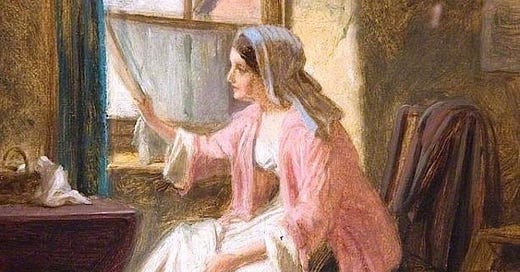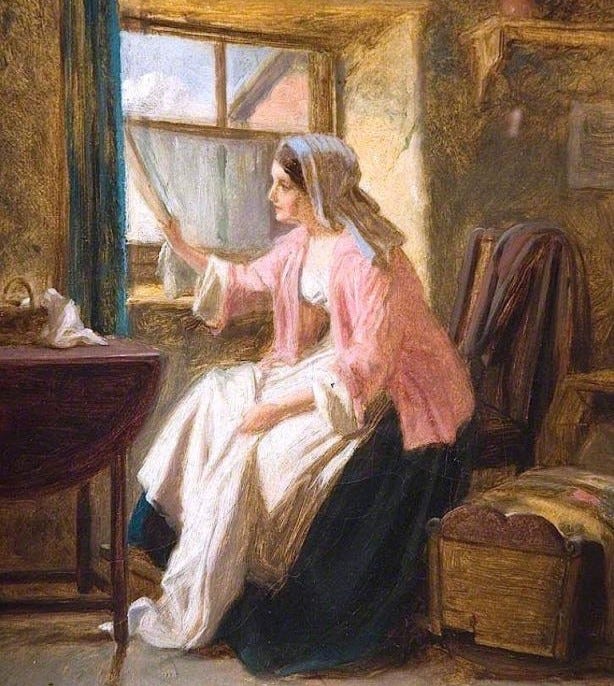“Expect the first spirit when the clock strikes one,” says the ghost of Jacob Marley to his old partner in the bill collecting business, Ebenezer Scrooge. That, of course, is early in the immortal novel, A Christmas Carol — actually in what the author Charles Dickens calls “the first stave,” meaning the first stanza. Now, he could have written, “The first spirit will appear to you when the clock strikes one,” but instead he puts us in Scrooge’s mind with our Word of the Week, expect. For Scrooge certainly does not want to be visited by any spirits. He isn’t a young man of great expectations, to take the ironic title from one of Dickens’ less cheerful novels. He’s an old man of no expectations at all, though of course, when you’re as old as Scrooge is, and as friendless in time of need, there is an event you ought to expect and prepare for. But he doesn’t want to think of that, either.
In fact, when he was a young man, Scrooge did have expectations, good things he looked forward to, things bound up with love and with the ideals and aspirations of youth. But he lost them one by one. That’s what his betrothed, Belle, tells him when she unbinds him of the promise that he would marry her. That same Belle is right now, as we’ll find out, celebrating Christmas Eve with expectations of her own. Not for children, no — she and her beloved husband have a happy brood of them! But her eldest daughter, who resembles her, is about to be married. And Scrooge will witness the scene, and know that if he had loved Belle, if he had looked beyond the figures of pound, shilling, and pence that had come to dominate his mind, he might have been that father and husband, with the hope of grandchildren soon to come.
No doubt our readers know the story. You know that Dickens will not abandon Scrooge to the prison of his counting-house mind. His passage from no expectations but an unmourned death and an untended grave to the greatest of all expectations comes only through repentance, which means that he shall keep Christmas in his heart as long as he lives. It isn’t just a change in attitude. It is like stepping out of the false world into the real world. Tiny Tim, the crippled little child of Scrooge’s underpaid clerk, Bob Cratchit, said in church that he was glad to be there, because he hoped it would be a comfort to the people to remember “who made the blind to see and the lame to walk.” Bob and his wife pray for their child, hoping against hope that he is getting stronger. They don’t know that their hope is going to come through a far more hopeless case than Tim’s. For Tim will live, if a dead man should come to life.
Advent, you see, is preeminently the season of expectation. Imagine a sentinel on the parapet, looking to the east for the first soft gleam of dawn. Imagine a child at an upper window, looking out to the sea as he waits for his father to come home. Imagine Mary, carrying within her bosom the greatest mystery the world will ever or can ever encounter, as she and Joseph begin, in troubled times and during a bad season for travel, their journey to the holy city of Jerusalem.
Our word expect captures the mood. It’s from Latin expectare, to look out, to look forth, but not just once; rather as something you do steadily. That’s because it’s a frequentative verb: specere means to look at, but spectare means that you do it again and again, or over a long while. Think of the verb agere, which means to act, to do, but agitare, with that -t- fixed in, means to do the same thing round and round: agitate. The Latin verb specere has a lot of cousins in English: all our words of Greek origin that have to do with looking, as you do from far away with a telescope, or at tiny things with a microscope, or inside somebody’s chest (looking with your ears!) with a stethoscope. If you’re hiding behind a lamppost, watching the fellow who’s watching you, you may be a spy — that’s from German. If you’re in Iceland, and you’re reading the book of Isaiah for Advent, you will be on the lookout for many a spa — not the place where you soak in the hot springs and play roulette, but a prophecy, a revelation of things to come.
Word & Song is an online magazine devoted to reclaiming the good, the beautiful, and the true. We publish six essays each week, on words, classic hymn, poems, films, and popular songs, as well a weekly podcast, alternately Poetry Aloud or Anthony Esolen Speaks. To support this project, please join us as a free or paid subscriber.
Listen to this episode with a 7-day free trial
Subscribe to Word & Song by Anthony Esolen to listen to this post and get 7 days of free access to the full post archives.














